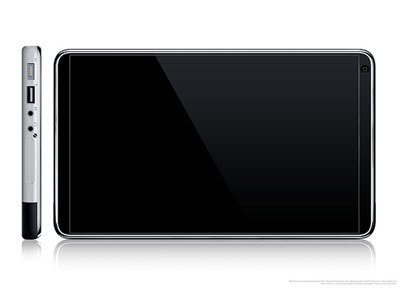Touch talk
 Word is, Apple’s getting ready to launch its first tablet computer, a logical sequel to the iPhone and iPod music player
Word is, Apple’s getting ready to launch its first tablet computer, a logical sequel to the iPhone and iPod music playerOn Jan. 27, Apple Inc. chief executive Steve Jobs will reveal a new product that will forever change the way we watch TV and read books, magazines, and newspapers. Or not.
Journalists around the nation received invitations to attend the unveiling on Wednesday. A spate of anonymous leaks from computer industry insiders has left little doubt that Apple will launch its first tablet computer - a portable device that’s a blend of iPod media player and laptop computer. It has the same dimensions as a small laptop, but with no keyboard, users instead will input data and control the device, sometimes called the “iPad’’ or “iSlate,’’ by touching the screen.
Apple declined to comment on the story. But creating such a device is “a no-brainer,’’ according to Frank Gens, chief analyst at the technology research firm IDC Corp. in Framingham. In a report last month, Gens said an Apple tablet is the logical sequel to the company’s hugely successful iPhone touchscreen device, and the iPod Touch music player.
But there’s no guarantee that an Apple tablet, which is expected to cost between $500 and $900, will be a success. Despite the company’s string of hit products and its reputation for consumer-friendly innovation, Apple has had its share of failures over the years. Remember the Lisa, the ill-fated predecessor of the Macintosh. More recently, there was the discontinued G4 Cube computer, and Apple TV, a home entertainment device that’s never attracted much of an audience.
Besides, Jobs won’t be the first computer industry titan to stand on a brightly-lit stage and declare that the era of tablet computing is at hand. The former chief executive of Microsoft Corp., Bill Gates, gave much the same speech nine years ago.
That’s when Microsoft introduced a version of its Windows operating system for tablet-style computers. “Within five years, I predict it will be the most popular form of PC sold in America,’’ Gates said to thousands attending a computer convention in Las Vegas.
Not quite. IDC found that only 121,000 “pure’’ tablet-based machines were sold last year, along with about a million hybrids, which combine a touchscreen and a keyboard. That’s a fraction of the 165 million standard laptop computers sold during the same period.
IDC analyst Richard Shim said tablet sales are sparse because for most computer users, “they don’t actually solve a problem.’’ Actually typing on a keyboard is often easier than scrawling text on a computer screen. So tablet PCs have been consigned to a few niche markets, like education.
Yet many industry-watchers think Apple may do better, because the company is probably not trying to create a replacement for the traditional laptop. Instead, they expect a new kind of entertainment and information device that people will buy for its own sake.
“You’ve basically got to start with a blank sheet of paper and say, what are people going to do with this device that they’re not going to do with some other device?’’ said Michael Gartenberg, vice president of strategy and analysis for the research firm Interpret LLC in New York.
Eric Openshaw, vice chairman of the US technology practice at consulting firm Deloitte & Touche, thinks Apple will deliver a “cloud computing’’ device that’s always wirelessly linked to the Internet through Wi-Fi wireless networking and 3G or 4G cellular data modems. He noted that Apple is building a massive data center in North Carolina, at a cost of $1 billion.
Openshaw believes the center will serve as a digital storehouse for Apple tablet users. For instance, the facility could hold secure, encrypted copies of the files on each tablet, ensuring that users would never lose vital data. “You’ll be able to depend on cloud capability for complete and constant backup,’’ Openshaw said.
In addition, the cloud-connected tablet could provide ready access to news, music, and movies, anywhere, anytime. A tablet owner might start watching a movie at home on his Internet-connected TV, Openshaw said. Then the user could punch up the same movie on his tablet during the bus ride to work, and instantly start watching from where he’d left off.
Apart from technology, Apple appears to be lining up attractive content offerings for the tablet, including access to major newspapers, magazines, and television programs. In a speech last October, New York Times executive editor Bill Keller hinted that his company was working to ensure that the newspaper developed an electronic version compatible with the upcoming Apple tablet. A spokeswoman for the Times, parent company of The Boston Globe, declined to comment on the matter.
But the Wall Street Journal has recently reported that the Times is actively discussing the matter with Apple, along with a host of other media companies, including CBS Corp., the Walt Disney Co., and News Corp., owner of the Journal.
Still, none of this guarantees that an Apple tablet will succeed with consumers, who may not want to spend up to $900 for such a device. A standard laptop with wireless access can deliver the same cloud computing features, and let you type up a memo as well.
To succeed, Apple’s tablet must offer something more, but what? In three days, we’ll find out.




 1/25/2010 12:42:00 AM
1/25/2010 12:42:00 AM
 kenmouse
, Posted in
kenmouse
, Posted in
0 Response to "Touch talk"
Post a Comment
Leave Your Thoughts & We Will Discuss Together